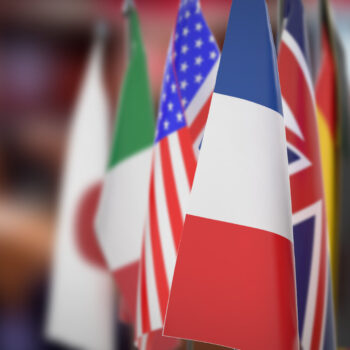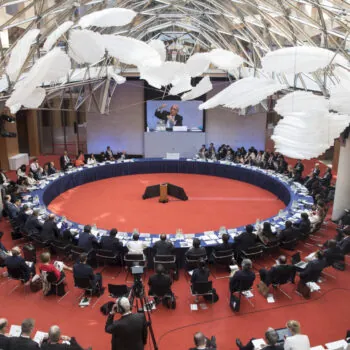This blog is the first in a series covering the NAFTA renegotiations.
“North America has the capacity, resources and the moral imperative to show strong leadership…on the Paris Agreement. We recognise that our highly integrated economies and energy systems afford a tremendous opportunity to harness growth in our continuing transition to a clean energy economy.”
These fine words from the North American Climate, Clean Energy, and Environment Partnership initiative, signed by Prime Minister Justin Trudeau, President Barack Obama, and President Enrique Peña Nieto on June 29th, 2016, in Ottawa, Canada, were cheering indeed. Better still, the words came with a long list of eminently deliverable commitments.
Fast-forward a year and we find that the words remain just words. Donald Trump’s election as President of the United States has fundamentally changed the geopolitics of the region, on climate and energy, as well as on many other economic issues.
Top officials from Canada, Mexico and the US are now renegotiating the 23-year old North America Free Trade Agreement (NAFTA).
On the campaign trail, candidate Trump consistently called NAFTA “the worst trade deal ever,” and, in one of his first official acts as president, he signed an executive order to renegotiate the agreement.
With elections looming in Mexico and midterms in the US, most expect a quick turnaround, but trade talks have been known to drag on much longer than anticipated. The first round – in which parties had to submit their proposals – has just ended, so we are about to get an important clue about the direction of travel of climate diplomacy and policy in Canada, Mexico and the US.
Canada
Canada is the only party that has officially made a reference to climate change in the context of the renegotiation. Canadian Minister of Foreign Affairs, Chrystia Freeland, let it be known on Monday, August 14th that Canada expects to reach a more progressive NAFTA agreement, and one that not only includes enhanced safeguards for workers, women and indigenous groups, but also maintains environmental integrity and addresses climate change.
Many will remember that Canada was the only country to withdraw from the Kyoto Accord, opposing binding agreements on GHG emissions reductions in the absence of US and Chinese commitments on climate. However, more recently under the more enlightened leadership of Prime Minister Justin Trudeau, Canada ratified the Paris Agreement; launched the first national framework on climate change (Pan-Canadian Climate Change Framework); and committed to phasing out coal-fired electricity by 2030. Canada’s commitment on climate continues to permeate through broader diplomatic processes, as seen in the case of NAFTA, and it presents an opportunity for climate diplomacy at the economic and regional level. Still, with such a high dependence on regional trade, particularly with the US (52% of Canada’s imports come from the US and 77% of exports destined for the US) – not to mention one of the largest bilateral investment stocks (totalling CA$836 billion in 2015), how hard Canada will push for strong language on climate and clean energy is a moot point.
Mexico
Mexico has had a love-hate relationship with NAFTA. On one-side, the economic boost and the industrialisation it brought to parts of the country are undeniable, on the other side, there is still the issue of inequality in its society.
So far, Mexico’s statements regarding any negotiation objective that considers climate change, have been general and vague. They have spoken only of their wish “…to move towards a regional trade that is inclusive and responsible…to strengthen cooperation and dialogue among NAFTA countries, in issues of trade, environment and better border infrastructure”.
For a country that has been ambitious in its reductions of carbon emissions, that has some of the largest solar and wind reserves in the world, and that is a global and regional leader on climate change, you can only hope that it won’t be blinded and overwhelmed negotiating around its recently opened oil and gas sector which has been paying-off with new discoveries. Ominously, one of Mexico's stated objectives is “…to take advantage of the potential of the changes made in the energy industry of Mexico and the region”. It is up to stakeholders to continually remind officials during the consultations ahead that the opportunities to profit from clean energies abound and that the future of Mexico's energy industry is not tied to exploitation of hydrocarbons. Canada has been slightly bolder in its intentions to address climate change. Perhaps it will take the lead, bring in Mexico and give this topic the relevance it deserves. If we want growth and a sustainable economic partnership, climate change is as important as car manufacturing was 23 years ago.
USA
It was Candidate Trump’s strident talk about NAFTA that led to this occasion and it is unlikely, to say the least, that the US will be inserting any language around climate change or clean energy. NAFTA and the Paris Accord are connected in that during the campaign they were both held-up as symbols of everything wrong with international collaboration that Trump’s “America First” agenda would fix. Unlike the Paris Agreement, President Trump toned down his criticism of NAFTA and agreed to renegotiate rather than “cancel” it. The administration’s stated goals, released by the US Trade Representative, were more moderate than expected and included adding a chapter on the digital economy and incorporating and strengthening labour and environment standards currently in NAFTA side agreements. The administration has made deficit reduction a specific objective for the negotiations and the litmus test of their success.
Chapter 6 of the original agreement pertains directly to energy and there is potentially some good that could come from these talks: they could lead to further energy system integration through cross-border infrastructure and enhanced cooperation on R&D – deliverables included in the Ottawa announcement last year. Energy Secretary Perry is reported to have said the text relating to energy is likely to get more of a “massage” as opposed to a full revamp. But as with all things Trump, how aggressively the administration will promote his “America First” agenda and “Energy Dominance” policy is hard to predict. With little legislative successes and many of his other campaign commitments flailing, will the US push hard for a big win on NAFTA? How hard will Canada and Mexico push back?
Big Picture
Over the last 23 years of the treaty, the world has been reshaped, and climate change is now an economic reality, changing the way business operates.
It was, understandably, not included in the initial negotiations, but it needs to be seriously addressed during this renegotiation, especially if the stated aim is to "upgrade" the agreement and "establish 21st century standards".
It seems the best we can hope for within the narrow confines of the trade talks as currently configured is more robust language on environment standards, along with – hopefully – a meaningful enforcement mechanism. The more intriguing developments will be the impact these trade talks will have on climate and clean energy policy being debated in other forums. For example, how hard will Canada and Mexico push Trump on his withdrawal from the Paris Agreement when a regional Growth Domestic Product of 20 trillion US dollars and millions of jobs are on the negotiating block? This will require close attention in the weeks and months ahead.


